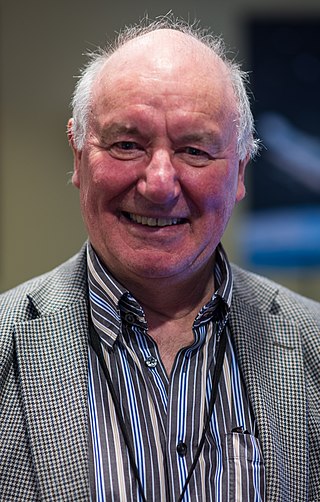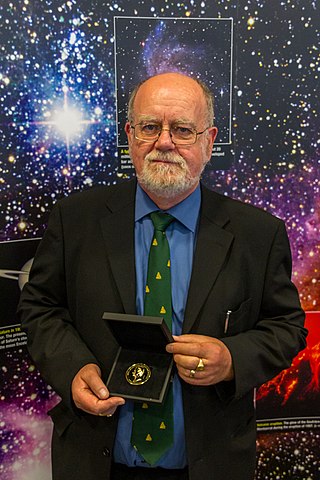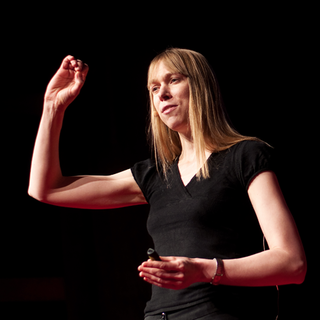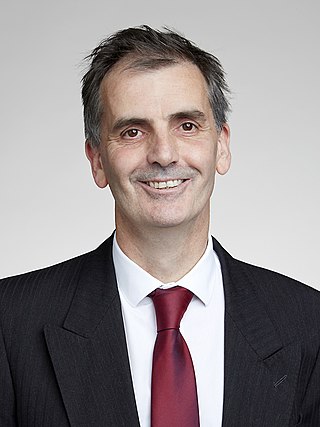Related Research Articles

Sandra Moore Faber is an American astrophysicist known for her research on the evolution of galaxies. She is the University Professor of Astronomy and Astrophysics at the University of California, Santa Cruz, and works at the Lick Observatory. She has made discoveries linking the brightness of galaxies to the speed of stars within them and was the co-discoverer of the Faber–Jackson relation. Faber was also instrumental in designing the Keck telescopes in Hawaii.

Malcolm Sim Longair is a British physicist. From 1991 to 2008 he was the Jacksonian Professor of Natural Philosophy in the Cavendish Laboratory at the University of Cambridge. Since 2016 he has been Editor-in-Chief of the Biographical Memoirs of Fellows of the Royal Society.

John Campbell Brown was a Scottish astronomer who worked primarily in solar physics. He held the posts of Astronomer Royal for Scotland, the Regius Professor of Astronomy at the University of Glasgow, and honorary professorships at both the University of Edinburgh and the University of Aberdeen.
Andrew R. Liddle is a Principal Investigator at the University of Lisbon. From 2018 to 2020 he was a Visiting Fellow at the University of Waterloo. From 2013 to 2017 he was Professor of astrophysics at the Royal Observatory Edinburgh. Publications include books and over 260 papers. He is a theoretical cosmologist and is interested in understanding the properties of the Universe and how these relate to fundamental physical laws.

William Nielsen Brandt is the Verne M. Willaman Professor of Astronomy & Astrophysics and a professor of physics at the Pennsylvania State University. He is best known for his work on active galaxies, cosmological X-ray surveys, starburst galaxies, normal galaxies, and X-ray binaries.

Kenneth Charles Freeman is an Australian astronomer and astrophysicist who is currently Duffield Professor of Astronomy in the Research School of Astronomy and Astrophysics at the Mount Stromlo Observatory of the Australian National University in Canberra. He was born in Perth, Western Australia in 1940, studied mathematics and physics at the University of Western Australia, and graduated with first class honours in applied mathematics in 1962. He then went to Cambridge University for postgraduate work in theoretical astrophysics with Leon Mestel and Donald Lynden-Bell, and completed his doctorate in 1965. Following a postdoctoral appointment at the University of Texas with Gérard de Vaucouleurs, and a research fellowship at Trinity College, Cambridge, he returned to Australia in 1967 as a Queen Elizabeth Fellow at Mount Stromlo. Apart from a year in the Kapteyn Institute in Groningen in 1976 and some occasional absences overseas, he has been at Mount Stromlo ever since.

Roger David Blandford, FRS, FRAS is a British theoretical astrophysicist, best known for his work on black holes.
Lennox Lauchlan Cowie FRS is a British astronomer, and professor at the Institute for Astronomy, University of Hawaiʻi.

Catherine Heymans is a British astrophysicist, the Astronomer Royal for Scotland, and a professor at the University of Edinburgh based at the Royal Observatory, Edinburgh.

Belinda Jane Wilkes is a Senior Astrophysicist at the Smithsonian Astrophysical Observatory (SAO) in Cambridge, Massachusetts, US, and former director of the Chandra X-ray Center.

Warrick John Couch is an Australian professional astronomer. He is currently a professor at Swinburne University of Technology in Melbourne. He was previously the Director of Australia's largest optical observatory, the Australian Astronomical Observatory (AAO). He was also the president of the Australian Institute of Physics (2015–2017), and a non-executive director on the Board of the Giant Magellan Telescope Organization. He was a founding non-executive director of Astronomy Australia Limited.

James Scott Dunlop is a Scottish astronomer and academic. He is Professor of Extragalactic Astronomy at the Institute for Astronomy, an institute within the School of Physics and Astronomy at the University of Edinburgh.

Sheila Rowan is a Scottish physicist and academic, who is Professor of Physics and Astronomy at the University of Glasgow in Scotland, and director of its Institute for Gravitational Research since 2009. She is known for her work in advancing the detection of gravitation waves. In 2016, Rowan was appointed the (part-time) Chief Scientific Advisor to the Scottish Government.
Ineke De Moortel is a Belgian applied mathematician in Scotland, where she is a professor of applied mathematics at the University of St Andrews, director of research in the School of Mathematics and Statistics at St Andrews, and president of the Edinburgh Mathematical Society. Her research concerns the computational and mathematical modelling of solar physics, and particularly of the Sun's corona.
Lyndsay Fletcher is a Scottish astrophysicist at the University of Glasgow who specialises in solar flares.
Douglas Cameron Heggie is a Scottish applied mathematician and astronomer, formerly holding the Personal Chair of Mathematical Astronomy at the School of Mathematics at the University of Edinburgh. His main research interests are in stellar dynamics.
Sera Markoff is an American astrophysicist and full professor of theoretical high energy astrophysics at the Anton Pannekoek Institute for Astronomy, University of Amsterdam. She is a member of the Event Horizon Telescope team that produced the first image of a black hole.

Johann Anton Zensus is a German radio astronomer. He is director at the Max Planck Institute for Radio Astronomy (MPIfR) and honorary professor at the University of Cologne. He is chairman of the collaboration board of the Event Horizon Telescope (EHT). The collaboration announced the first image of a black hole in April 2019.
Gillian Susan Wright is a Scottish astronomer who is currently the director of the UK Astronomy Technology Centre in Edinburgh, UK. She has also been involved in the development and construction of the James Webb Space Telescope as the European Principal Investigator for the Mid-Infrared Instrument (MIRI). In 2006 Wright was appointed MBE for services to science.
Norna Robertson is a lead scientist at LIGO at California Institute of Technology, and professor of experimental physics at the University of Glasgow. Her career has focused on experimental research into suspension systems and instrumentation to achieve the detection of gravitational waves.
References
- ↑ "Professor Annette Mairi Nelson Ferguson FRSE - The Royal Society of Edinburgh". The Royal Society of Edinburgh. Retrieved 17 June 2018.
- ↑ "Annette Ferguson - Edinburgh Research Explorer". www.research.ed.ac.uk. Retrieved 16 August 2020.
- ↑ Ferguson, Annette. "Personal Web Page" . Retrieved 9 November 2007.
- ↑ "Professor Annette Mairi Nelson Ferguson FRSE". The Royal Society of Edinburgh. 24 March 2020. Retrieved 16 August 2020.
- ↑ "Professor Annette Ferguson". DDI. Retrieved 16 August 2020.
- ↑ "Fellows - The Royal Society of Edinburgh". The Royal Society of Edinburgh. Archived from the original on 8 October 2016.
- ↑ "Alexander von Humboldt Foundation Award | School of Physics and Astronomy". www.ph.ed.ac.uk. Retrieved 17 June 2018.